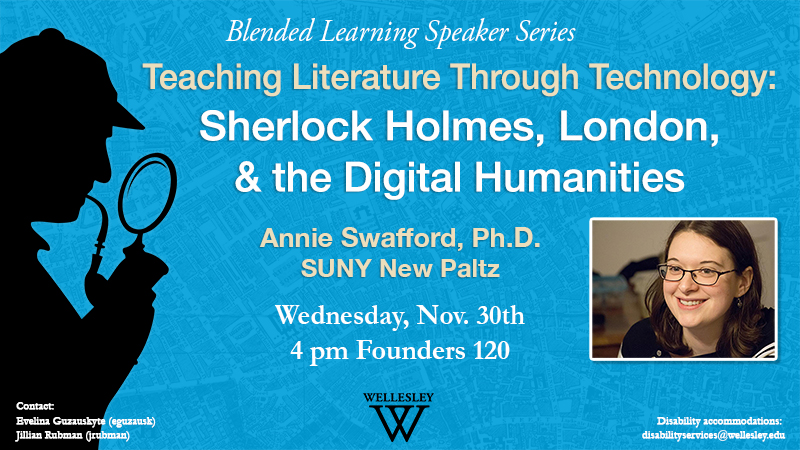Speaker Series
Blended Learning Speaker Series
We continue to bring outstanding speakers to campus to present their work on a wide variety of blended learning topics. For more information and a complete schedule of Blended Learning events, see the All Events page.

Hannah Alpert-Abrams
Multilingual Texts in the Digital Age
April 25, 2019 at 10:00am in the FND 300CC Humanities Commons
Hannah Alpert-Abrams discusses textual editing in the digital age and copying techniques and processes (by hand and by machine) in the case of Molina’s Vocabulario (1555). You can see her talk slides here: https://www.halperta.com/pdf/2019-wellesley.pdf.
Download the "Multilingual Texts in the Digital Age" event poster

Paul Firbas
Digital Humanities Approaches to Colonial Latin American Studies: The Lima News-Sheets (Diario de Lima 1700-1711)
April 11, 2019 at 4:00pm in the FND 300CC Humanities Commons
Paul Firbas shares his visualizations of the textual circulation and the transatlantic network of cities (and printers) from the perspective of a Lima print shop, 1700-1705. He discusses the first known periodical news-sheets printed in the Americas released from the workshop of Joseph de Contreras y Alvarado in Lima, capital of the viceroyalty of Peru, between the years of 1700 and 1711, and the complex South American postal routes up to the administrative and cultural center of Lima. The news-sheets are an invaluable testimony of the vast circulation of people and information–coming from printed, manuscript and oral sources—between Europe and Peru, and within South American regions and cities.

Jeffrey Ravel & Crystal Hall
Whales, Galileo, and the Digital Humanities
November 7, 2017 at 4:30-6:00 pm in Founders 120
Jeffrey Ravel - 34,000 Theater Performances and 2200 Images of Whales: Some Lessons Learned in the Digital Humanities
This talk will draw on experiences directing two digital humanities initiatives, the Comédie-Française Registers Project and the Visualizing Maritime History Project. The former is now reasonably mature and available online, while the latter is still in progress. Topics will include the pleasures and perils of international collaborations, the overlap between research and pedagogical agendas in the Digital Humanities, and the synergies between material collections and digital projects. Triumphalist DH narratives will be avoided; expect instead a tempered assessment of the challenges facing humanities scholars working in digital spaces today.
Crystal Hall - Lessons from Galileo’s Digital Library
This presentation describes an ongoing project to digitally recreate Galileo Galilei’s personal library. Rather than treating the library as a catalog of books, the project uses digital tools to create and navigate an intellectual artifact of choices and circumstances. Examples from the library show both what can be achieved when historical data is (mostly) complete and what can be done with incomplete, ambiguous, or deceptive data. The lessons from the library have three ends: a better understanding of early modern intellectualism, identifying the strengths and limitations of digital tools, and suggesting the research and pedagogical opportunities of such a project.
Download the "Whales, Galileo, and the Digital Humanities" event poster

Julia Flanders
The Women Writers Project at 30
May 8, 2017 at 3:30 & 4:45 pm in the Library Lecture Room
3:30 - 4:30 pm - The Women Writers Project at 30: The Data of Writing, Reception, and Intertextuality
The Women Writers Project is approaching its 30th year as a digital humanities research and publication project. This presentation will explore the WWP's history and its research program in scholarly text encoding, including a close look at two projects focusing on reception history and intertextuality.
4:45 - 5:45 pm - Under the Hood of the WWP: Data, Tools, and Education
This presentation will look at how the Women Writers Project's publications work, including TEI-encoded data, XML publishing systems, and the work flows and training materials that support this rich and complex information environment. We'll also consider the principles of sustainability that have enabled these systems to survive and adapt over three decades of changing technologies and needs.

Michelle Brock
Choose Your Own Witch-trials: A Pedagogical Adventure in Text-based Gaming
April 27th, 2017, 4:30 - 5:30 pm in PNE 339
The witch-hunts of early modern Europe, some of the most fascinating and disturbing episodes in the history of the Western world, provide teachers with significant pedagogical opportunities and challenges. This presentation discusses a project in which students create games that examine regional differences in the European witch-trials. More generally, it explores the use of interactive text-based games in the classroom.

Kelly Schrum
Teaching and Learning with Digital Storytelling
March 16, 2017, 12:30 - 2:00 pm in the Library Lecture Room
Digital storytelling can be many things: narrative, interactive, linear, nonlinear, immersive, artistic, educational. What happens when we use digital storytelling to communicate academic research? When we use it in the classroom to teach digital skills as well as content? This workshop explores these questions and more, including practical strategies for integrating digital storytelling into the classroom across disciplines.
Download the "Teaching and Learning with Digital Storytelling" event poster

Joanna Swafford
Teaching Literature Through Technology: Sherlock Holmes, London, and the Digital Humanities
November 30, 2016, 4:00 - 5:00 pm in FND 120
How can we balance the needs of teaching literature with teaching students to use technology? This talk takes up two classes as case studies to address this question. “Digital Tools for the 21st Century” uses the Holmes stories as a corpus on which to practice digital humanities methodologies and tools, including visualizations, digital archives, mapping (GIS), and distant reading. “Virtually London: Literature and Laptops” uses digital archives and digital mapping to examine how issues of gender, class, and race were embedded in the geography of London itself, and by extension, in literature about London and its environs.
Download the "Teaching Literature Through Technology" event poster


